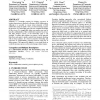Free Online Productivity Tools
i2Speak
i2Symbol
i2OCR
iTex2Img
iWeb2Print
iWeb2Shot
i2Type
iPdf2Split
iPdf2Merge
i2Bopomofo
i2Arabic
i2Style
i2Image
i2PDF
iLatex2Rtf
Sci2ools
SIGSOFT
2006
ACM
2006
ACM
Local analysis of atomicity sphere for B2B collaboration
Atomicity is a desirable property for business processes to conduct transactions in Business-to-Business (B2B) collaboration. Although it is possible to reason about atomicity of B2B collaboration using the public views, yet such reasoning requires the presence of a trustworthy party who has complete knowledge of these views. It is inapplicable when some parties may want to keep the confidentiality of their collaborative partners for privacy and other business reasons, or the trustworthy party is not available. To address this problem, we propose a novel approach that allows each party to jointly conduct local atomicity checking with its direct partners. It is based on iterative forwarding and regression of compensability properties between each pair of direct partners. This approach is applied to a case study based on a real-life insurance process in the motor damage claims domain. Categories and Subject Descriptors H.5.3 [Information Interfaces and Presentation]: Group and Organizat...
Keywords Process Collaboration | Local Atomicity | SIGSOFT 2006 | Software Engineering | Trustworthy Party |
| Added | 20 Nov 2009 |
| Updated | 20 Nov 2009 |
| Type | Conference |
| Year | 2006 |
| Where | SIGSOFT |
| Authors | Chunyang Ye, S. C. Cheung, W. K. Chan, Chang Xu |
Comments (0)

